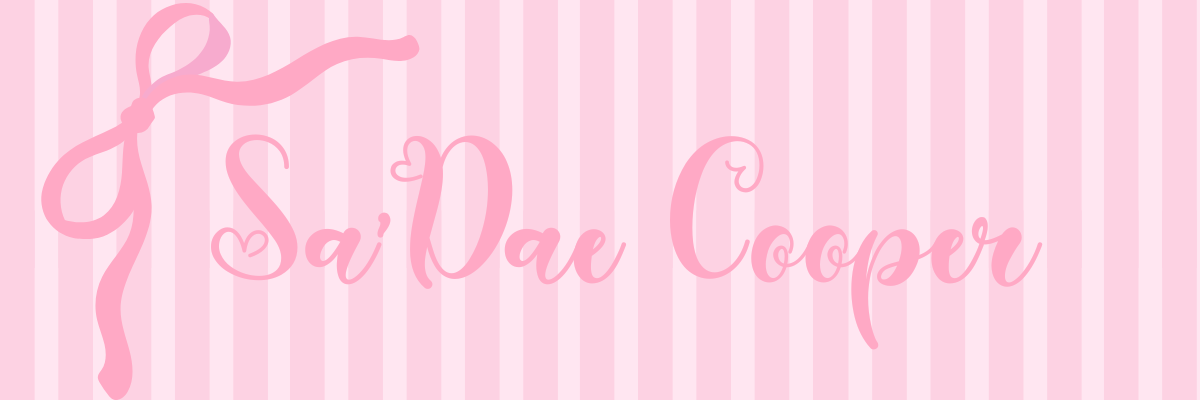Your Goal Grade
Highlight the header for the column below to indicate which grade you plan to work toward in the course. Meeting the basic requirements for your chosen letter grade, according to the table below, is mandatory.
| A Work | B Work | C Work |
-Misses one class or less, or completes make-up work for excused absences -Annotates all readings thoroughly -Makes substantive comments in discussions -Completes all assignments on time (or has an approved extension request) -Work demonstrates intellectual engagement, care, effort, and growth in response to feedback -Collaborates substantially, contributes to vision, works equally with peers | -Misses two classes or less, or completes make-up work for excused absences -Annotates readings -Often participates in discussion -Completes all major assignments on time (or has an approved extension request) -Completes most SAs on time -Work demonstrates care, effort and growth in response to feedback -Collaborates equally, completes required work | -Misses three classes or less, or completes make-up work for excused absences -Completes most readings -Sometimes adds to discussion -Completes all major assignments on time (or has an approved extension request) -Completes at least four SAs -Meets minimal expectations on assignments; shows limited growth in response to feedback -Completes required collaborative work |
First-Week Introduction
After gaining much knowledge from last semester, I chose the following goals because they best fit my work ethic and what CODES stands for. The most challenging goal is 5b: access information using effective, well-designed search strategies and appropriate sources. This goal will be most challenging because appropriate sources and search strategies are essential to having a good Zotero folder and evidence for our research project. Evidence is also essential to all the work we do within CODES so along with this goal being important I also believe it will be challenging. The assignment that I’m most excited about this semester is the Final Project. The strategies I will set for myself this semester are to stay organized, keep track of all assignments, participate, ask questions, and grow with my writing. With these strategies and goals, I plan to have a successful semester in CODES 123.
Midterm Introduction
The past view weeks I have developed many strengths and learned how to improve in many different aspects. Overall, I have been learning much from this course, each discussion and assignment has been helping me build character and gain knowledge. Ive slowly been overcoming many things and learning how to participate in group discussions and share my opinion , while also developing research methods and bettering my communication skills. Going into the second semester I want to continue to develop better research skills while also improving my communication skills so I can be more engaged and take away key concepts in CODES 123.
Final Introduction
During this semester. I developed many strengths and learned how to improve in many different aspects. Overall, I enjoyed the semester, each discussion and assignment helped me build character and attain more knowledge. I have learned and taken away many things. My first year as a CODE scholar taught me a lot along the way I was able to identify my weaknesses and turn them into strengths. One thing I will take away from this class knowing it’s okay to speak. When you get involved in discussions you learn a lot and get to see other’s points of view. Overall, I enjoyed CODE 123 and CODE as help me grow tremendously during my freshman year.
Course Goals
Goal 1 (20%)
Based on 12c: work independently toward goals by contributing and meeting deadlines.
| What will you do to learn the content/ develop the skill? | What examples will you add to the portfolio to demonstrate your learning? | What characteristics of the chosen examples demonstrate you have met your goal? |
| Stay focused and always put my best foot forward so I can meet deadlines. Practicing time management to ensure all deadlines are met Working towards various goals set by me, my group, or my professors. | Reflections Top 5 assignments Complete/Incomplete marks on blackboard | The complete/incomplete marks on the blackboard will show my consistency & if deadlines were met. The top 5 assignments will demonstrate the work ethic I contribute to each reading weekly to meet deadlines. The reflections will show how I can analyze while also meeting deadlines. |
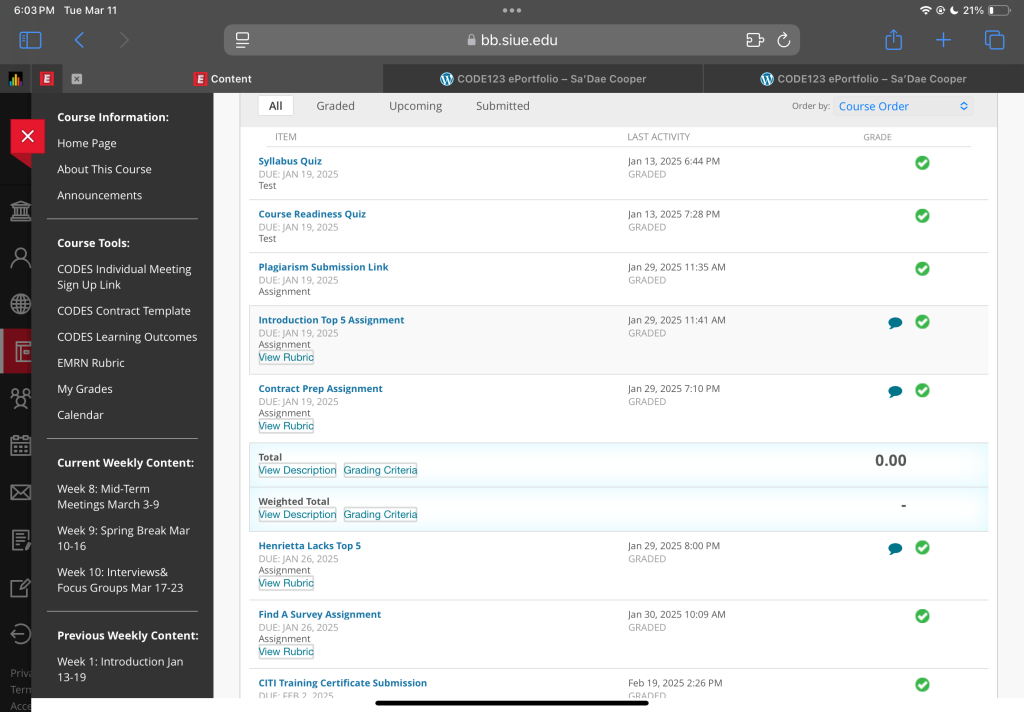
This piece of evidence shows how I was able to work indepently and complete assignments on time.
Reflection
Sa’Dae Cooper
Dr.Bradley
CODE 123
4 April 2025
Reflection
- Researchers often make small but important decisions about what to include, change, or leave out when working with qualitative data. What are some of the choices you made when analyzing the content from your interviews, and how do you think those choices shaped your findings?
- The term “data cleaning” is often used in research, but it suggests that some parts of the data are messy or unimportant. How does this language influence the way we think about qualitative research, and what might be a better way to describe the process?
- When preparing and organizing data, how can researchers ensure they keep important details and differences without losing clarity?
- Some people view qualitative research as less rigorous or reliable than other types of research. Why do you think this is the case, and how might that perception affect the way qualitative findings are shared and valued?
- Coding qualitative data can be a slow and detailed process, but it also helps reveal patterns and insights. How did you balance the challenge of this process with the need to organize and make sense of your data?
When analyzing the content from my interviews, I decided to leave everything in and not to change anything. I decided that because I wanted the answers and the interviews to be as authentic as possible, I needed to ensure all the information was important for context and data collecting. When analyzing research, most researchers go through the process of data cleaning. I believe data cleaning shouldn’t be associated with research because it can suggest that some research is unimportant when all the data collected is important and necessary. Using that term can influence researchers to look for outliers and think there’s a messy part in their qualitative research. Instead, words like data organization or data analysis could be used. To get important details and differences, researchers can use a spreadsheet to keep things organized or create a system best for them, depending on their research. The organization methods can range from graphs, charts, notes, and spreadsheets. Using those tools while also breaking data up into specific categories is a great way to stay organized without losing clarity. Since qualitative research is more about descriptions instead of numbers, some might view it as less reliable because it doesn’t include math or percentages, which to some, math and numbers can make things more difficult. Some can also view numbers as hard evidence, and most have the mindset that numbers don’t lie, so quantitative research can be seen as more valuable than qualitative. Coding qualitative data can be tricky, but the best way to make sure the data makes sense and is organized is censoring certain words.
The reflection shows how I was able to reflect on the questions and sources and independently work to meet the deadline for the assignment.
Top Five
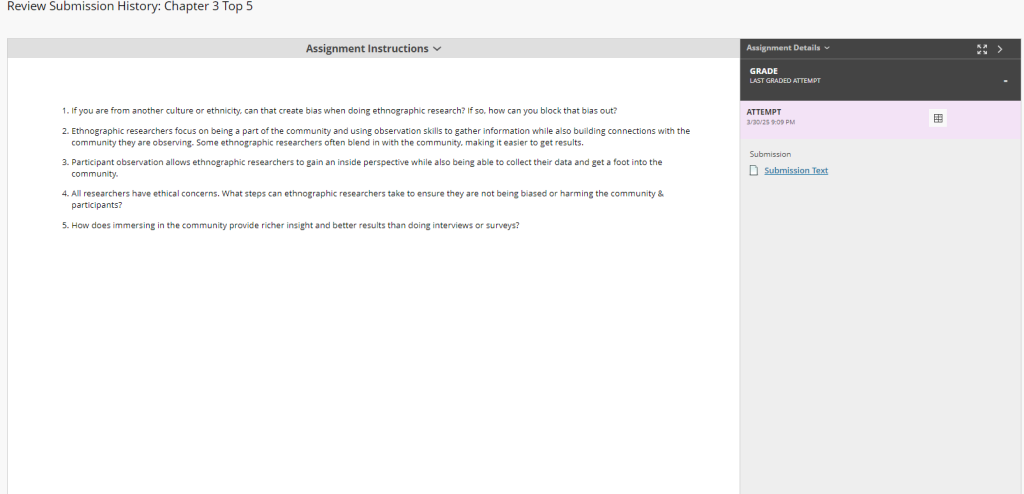
The top 5 assignments demonstrate the work ethic I contribute to each reading weekly to meet deadlines.
Reflection
Sa’Dae Cooper
Professor Bradley
CODES 123
7 March 2024
- How did groupthink contribute to the decision-making failures that led to the Challenger explosion?
- In what ways did group polarization amplify risk-taking or minimize concerns within NASA and Morton Thiokol?
- How might social facilitation have influenced individuals in high-pressure environments, such as engineers, managers, community organizers, or astronauts?
- Did social loafing play a role in the decision-making process? If so, how might shared responsibility have affected individual accountability?
- What lessons can we learn about group dynamics from the Challenger disaster to improve decision-making in high-stakes environments?
Reflection Three
The Challenger explosion was a devastating tragedy, but when working on a task with such importance as the Challenger, information can slip through the cracks. I believe that’s what contributed to the decision-making failures. When you have multiple parties on a team, it can be difficult to include everyone’s opinion, especially when you have individuals on a team who might feel as though they are more qualified than others or have more seniority. Since the Challenger mission had so much media coverage and had many people excited, it was more of a push to get the mission started and in space. That sense of eagerness minimized the concern within NASA and Morton Thiokol. I believe social facilitation didn’t influence this incident because if it did, the individuals working on their performance would’ve been enhanced, and the outcome would’ve been better. If the performance had been enhanced, then mistakes would have been caught, and the risk would have been minimized. I do believe that when working in an environment with engineers, managers, astronauts, etc, people tend to be influenced by social facilitation. The others working with you can motivate you because they could be smarter, or just as smart, or have more seniority than you. Unlike social facilitation, I do believe social loafing played a role in the decision-making process. Even though the project took a team effort, I believe the hard work was done. The higher-ups didn’t care about what was being said, so they put in less effort, and the only effort they put in was making sure the mission was set and ready for the media and its scheduled time. After learning about the Challenger incident, the lesson I took away was that when working in a group, make sure you build trust and respect while also having great communication. Also, don’t be scared to check others’ work. I believe if these steps were taken, the Challenger mission would have had a different outcome.
The reflection shows how I contribute to all of my goals overall, by working hard, developing ideas, and analyzing while still meeting the deadline.
Goal 2 (20%)
Based on 8c: Develop clear, innovative central messages with significant supporting materials
| What will you do to learn the content/ develop the skill? | What examples will you add to the portfolio to demonstrate your learning? | What characteristics of the chosen examples demonstrate you have met your goal? |
| Create a clear and central goal that aligns with the objective and message. Create different ideas while also supporting my ideas and thoughts. Delivering a clear and central message to classmates, professors, or partners | Top 5 assignments Data set review assignment Reflections Final Project | My top 5 assignments will help me draw from what I read or watch and make observations and realizations that can support my ideas. The reflection assignment will allow me to exercise my thoughts and ideas into a central message. The data set review assignment will allow me to engage with important content and show how I back evidence found by using supporting materials. The Final project will highlight my analytical skills, which are critical for gathering evidence and developing messages with supporting materials. |
Final Project
The Final project gave me a chance to highlight my analytical skills, which are critical for gathering evidence and developing messages with supporting materials. Evidence being an important part of this project.
Reflection
Sa’Dae Cooper
Professor B
CODE 123
31 January 2025
Reflection #1
Being a researcher is a job that takes a lot of time and dedication, but along the way, you gain knowledge. Most researchers choose fieldwork over controlled lab experiments so they can get hands-on work in the natural state and or environment of what they’re studying. They can collect data and directly observe rather than doing a controlled lab experiment. Whether or not you’re doing fieldwork or controlled lab experiments, ethics comes with being a researcher. I believe people helping run the study should also have ethics because they are part of the experiment, and they are helping with the fundamental parts that contribute to the experiment and study coming together. Within my group project, there aren’t data sets related to our research topic. Our project deals with archival research, oral history, and interviews. For our group, we aren’t doing surveys, but in my opinion, if we were there wouldn’t be any potential influences that could affect responses. Researching the community that best fits the criteria for our study and once that is done, narrowing the population down to willing participants. Participants who give consent and have no problem representing Cahokia Heights and being a part of our study.
The reflection assignment allowed me to exercise my thoughts and ideas into a central message so I could honestly reflect on the given material.
Final Project Transcript

I was able to use the hashtag Black Lives Matter to gather evidence and supporting material for the final project.
Data Set Review Assignment
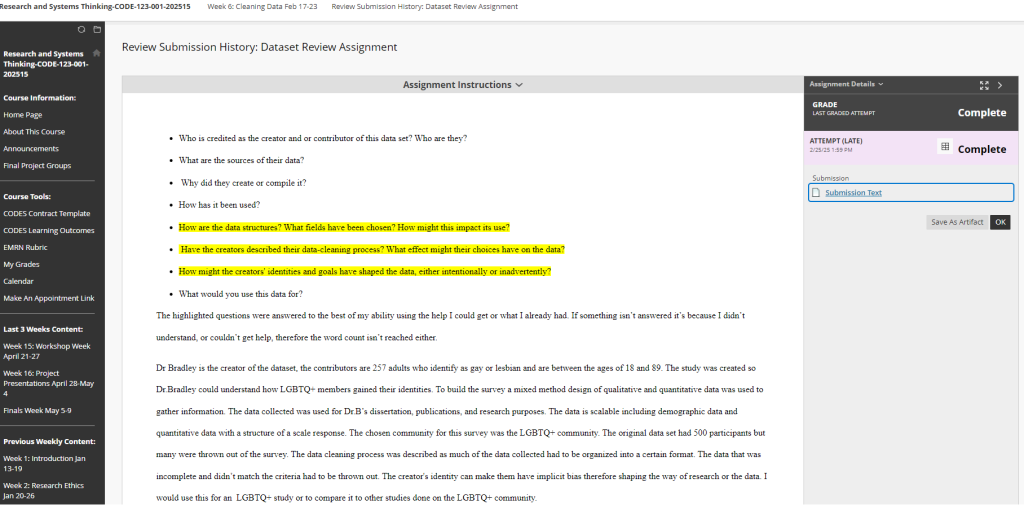
The data set review assignment allowed me to engage with important content and show how I backed the evidence found by using supporting materials.
Goal 3 (15%)
Based on 4c: Applies ethical concepts to a question and considers their full implications.
| What will you do to learn the content/ develop the skill? | What examples will you add to the portfolio to demonstrate your learning? | What characteristics of the chosen examples demonstrate you have met your goal? |
| Have an ethical view when looking at questions. Consider right vs wrong and the ethics behind the questions, assignments, or research. Look at all aspects and ethical concepts | CITI Training & Quizzes Reflections Plagiarism Training | The completion of CITI training shows that I have an understanding of good ethical skills. The reflections will allow me to reflect on the given material while also applying ethics to questions. |
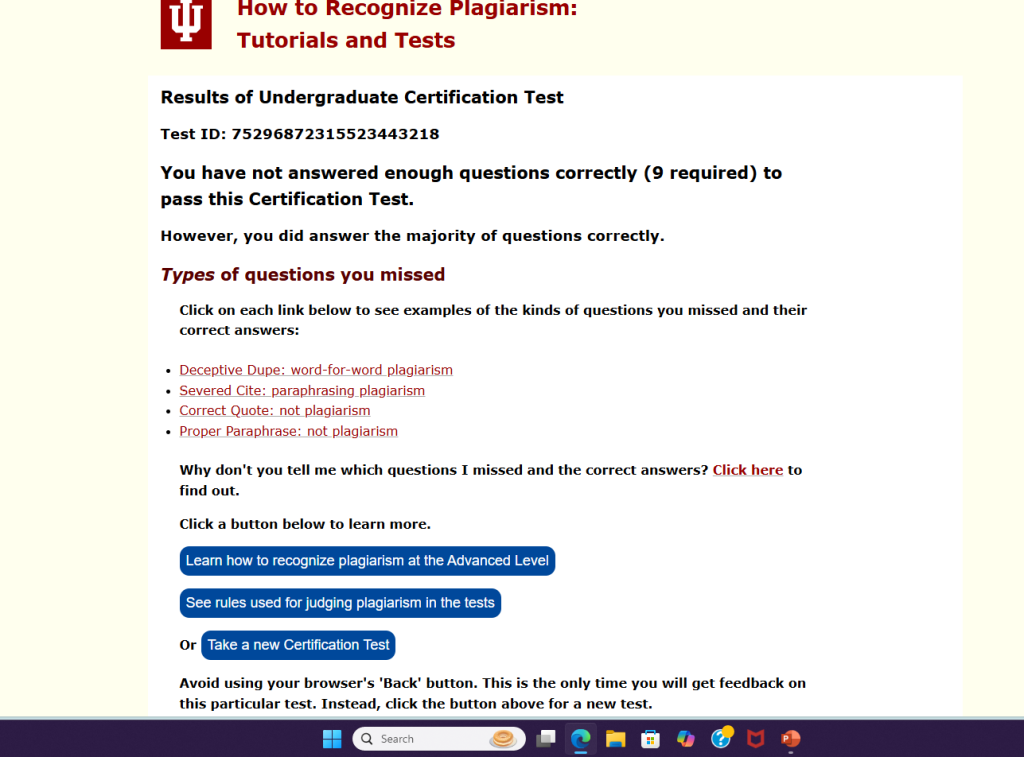
The completion of this training show I understand the ethics behind research and the do’s and don’ts when it comes to doing research.
CITI Training
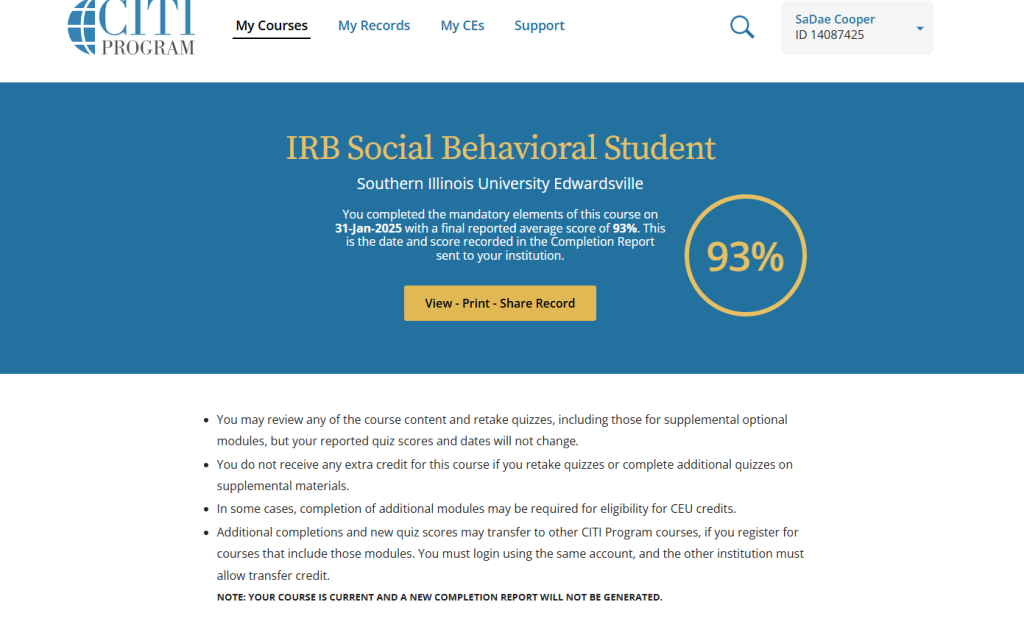
This training helped further my knowledge of the ethics behind research while also preparing me for when I did my research.
Reflection
Sa’Dae Cooper
Dr.Bradley
CODE 123
11 April 2025
Reflection
- What are some decisions the author made when working with historical and archival materials? How might these decisions have shaped the story they were able to tell?
- Archives are not neutral—they often reflect what was saved, who had power, and whose voices were left out. How do ideas like “archival silence” or “gatekeeping” affect how we understand the past?
- When archives are spread across different places or hard to access (like “silos”), what problems might researchers face?
- If you were to use archives in your own project—especially on topics like water or inequality—what kinds of sources would you look for? What challenges do you think you’d face?
The author made many decisions, but one important decision that was made was prioritizing those everyday experiences, not just looking at government records and archives. Listening to the people who lived there and prioritizing their experience. He used different methods to tell the stories for the people, using newspapers, archives, etc. The author made a voice for those who were silenced or weren’t able to tell their story. The author was able to question the problem and take a deeper look at the issue at hand. Not only seeing that the rich people or land were affected but seeing that the poor were affected and that their stories mattered but also that there was inequality. These decisions that the author made showed a different perspective on the water issue and looked at the social dynamics, like who suffers, who benefits, and what’s being damaged. The author highlights archival silence instead of ignoring them or acting like they didn’t exist. The idea of archival silence reminds us about inequality, such as how people without power were less likely to be recorded or documented and how some things were partial. Archives being spread out or in different areas can cause problems like time consumption, getting permission, spending money, and also not being able to paint a full picture because of the lack of evidence or not having all of the archives. I have been using archives in my project, so the sources I would use are photos, newspapers, maps, and government records. An issue that we did run into when using and digitizing archives is the fact that you have to be very fragile. The slightest thing can damage archives, many of them are years or decades old, so you have to be very gentle with the archives.
The reflection shows how I’m able to take material consider all implications and then reflect on the questions or material presented to me.
Goal 4 (20%)
Based on 11c: Read using an appropriate lens and can engage in a continuing dialogue within and beyond a discipline or a community of readers.
| What will you do to learn the content/ develop the skill? | What examples will you add to the portfolio to demonstrate your learning? | What characteristics of the chosen examples demonstrate you have met your goal? |
| Looking at readings and stories carefully and with an appropriate lens. Be respectful and show engagement through body language. Carefully read, annotate, and retain material | In-class discussion sessions /Guest Speakers Chapter Readings (Give Methods A Chance) Article Annotation Top 5 assignment | I will use the books and articles we will read over time, starting with Give Methods A Chance and also our article annotations. During in-class discussions, I will be attentive, respectful, and engaged when discussions are happening. I will read the articles given for the Top 5 assignment through an appropriate lens so I can analyze them to come up with the best top 5. |
Article Annotation
Sa’Dae Cooper
Professor B
CODES 123
20 February 2025
Article Annotation
The article was confusing and stumbled in some parts. Once I broke the article down and dissected segments of it, it was easier for me to understand as a whole. Based on what I know about the research, I would say the research was careful and detailed. They were very detailed about their opinions and data cleaning within themselves. They were most detailed about how data cleaning is bad and not beneficial to the research. The results are important but not new. Many researchers don’t do data cleaning, and some do. I would say the results give a new and different perspective on the importance of not cleaning data and what you shouldn’t do. As far as limitations, I would say a little, because the overall theme of the research is against cleaning. When reading this article, it does leave hints of bias and limitations because the researchers specifically want to implement no data cleaning and seem a little biased in their opinion. No, it doesn’t compare to other researchers that I’ve seen or read. It’s far from most research because most research I saw was based on a group of people or a constant independent variable. It doesn’t challenge my previous knowledge or assumptions, but it does enlighten me because before this article, I didn’t know much about data cleaning or the actions you can take to do it. The article gave me more insight into what exactly data cleaning was and how important it is to the research process. Data cleaning can help you with other research cause you can see common outliers or even mistakes made as a researcher. This article is very informative, and researchers can take what was said in this article and use it for future reference when scoping through their data and projects.
References
Rawson, K., & Munoz, T. (n.d.). Against Cleaning. 14.
Top Five
- After interviews are conducted, what do the interviewers do with the data collected? Do interviewers use collected data from past interviews to change how they conduct future interviews? /Analyzing, transcribing, and coding the collected data from interviews and focus groups can show common themes and patterns
- When creating focus groups, what do researchers look for in participants? How can they select the participants but still make sure there is diversity?
- Can researchers be biased when creating a focus group because of previous encounters or things that went wrong in previous research projects?
- How do interviewers manage group dynamics in a focus group to ensure that everyone feels included?
- The quality of the questions in an interview and focus group can impact the data that s collected and how much relevant data is collected.
Reading Give Methods A Chance through the appropriate lens helped me create my top five.
Top Five
1. Do you think people change their characteristics or identities to be like the others they are often around? If so, why?
2. As humans, we initially all have implicit bias; therefore, it’s easier for us to categorize ourselves or others into categories and place stereotypes on others before knowing them.
3. I’ve never liked working in groups because I was always left to pick up the slack. After reading this article, I now understand why, when working in a group with others, you always have one or two members who lack responsibility or don’t meet the needs of the group.
4. Knowing how to work together as a team and not be a lone individual is important because when working in groups, everyone has to contribute to the project as a whole. Having everyone’s input can lead to better outcomes and decisions.
5. How can working in a group with individuals who are different from you change your social identity and interactions?
Article Annotation
Goal 5 (25%)
Based on 5b: Accesses information using effective, well-designed search strategies and appropriate sources.
| What will you do to learn the content/ develop the skill? | What examples will you add to the portfolio to demonstrate your learning? | What characteristics of the chosen examples demonstrate you have met your goal? |
| Using Google Scholar and SIUE library to access information. Using MLA or APA format when citing and organizing sources. Using the library database for research. | Library Training Find a survey assignment Reflections Final Project | To complete my final project, I will have to access information using various sources and search strategies. The Final project will strengthen my search strategies because I will be able to use effective skills to find suitable pictures and sources. The Library training will show me how to effectively access appropriate sources. |
Reflection
Sa’Dae Cooper
Professor Bradley
CODES 123
28 March 2025
Reflection 4
Your identity, culture, and background can shape your positionality. The things you experienced in life before your research can influence the way you interact with the community you’re studying. Also, your positionality can affect how researchers mitigate bias. With ethnographic research, you have to work with the community. Making sure you maintain fairness and include the whole community is important and respecting their privacy and culture while also using methods such as oral history and storytelling to get information from their perspective. The best way to organize and present the data collected to make it fair and accurate is to make sure you get the community’s approval and avoid stereotypes and bias. Make sure you include the community’s voice so the data can reflect the community properly. Ethnography helps communities like the Gullah/Geechee people have a platform to share their stories and history. Ethnographic research can promote and encourage social change. While also documenting their history and culture.
The reflection shows how I was able to use the sources given to me and also my own sources to answer the questions presented to me.
Final Project
The Final project will strengthen my search strategies because I was able to use effective skills to find suitable pictures and sources that later helped me come up with the themes for my project.
Final Project
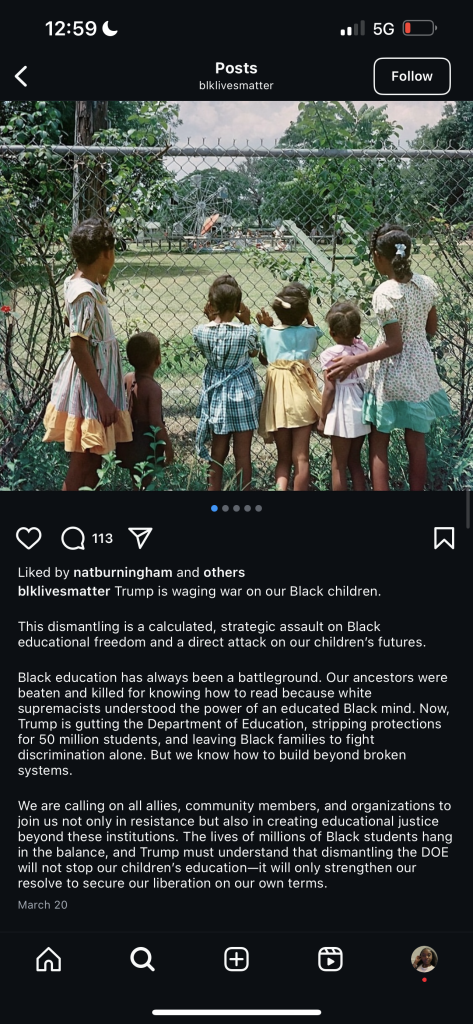
An example of a search strategy I used the search strategy being the hashtag BLM
Transcript Final Project

To complete my final project, I had to access information using various sources and search strategies.
Find A Survey Assignment
The Find a Survey assignment shows how I was able to use good search strategies to compare different sources.
